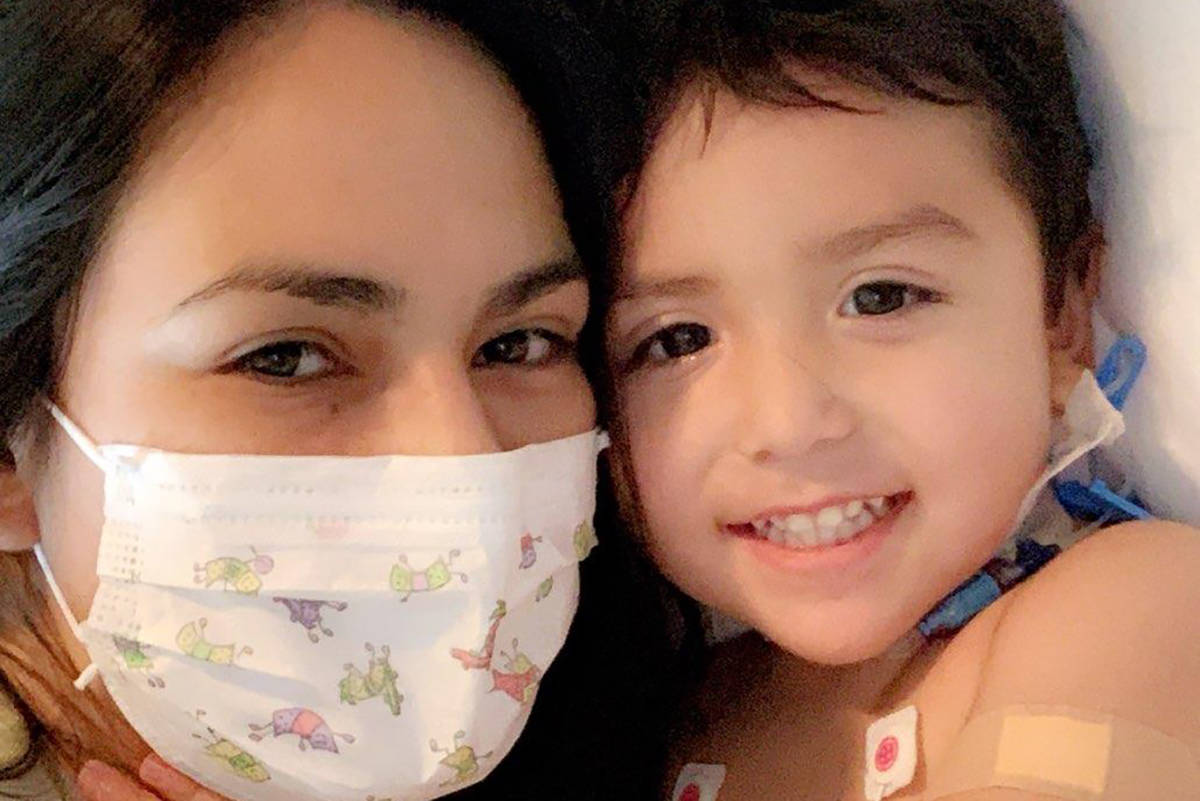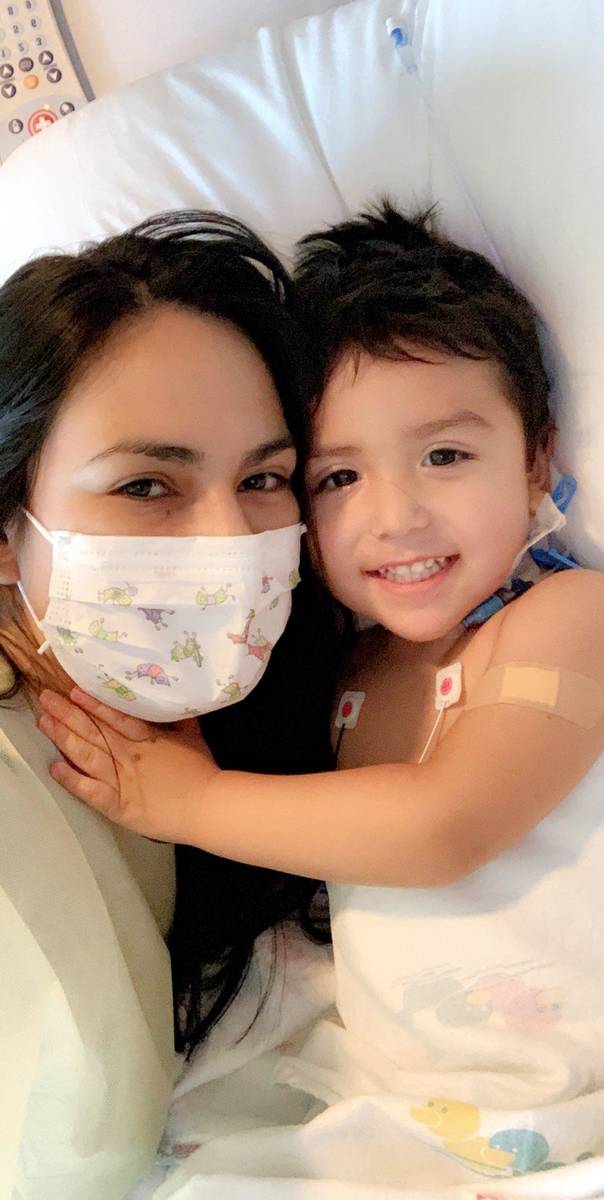Las Vegas hospital treats kids with rare syndrome related to COVID-19
For more than two weeks, Karen Sombra spent every day and night in a Las Vegas pediatric intensive care unit where her 2½-year-old son was being treated for complications from COVID-19.
She wanted to be there to comfort him, as Sebastian Rodriguez was terrified by the medical staff in “astronaut” suits, the head-to-toe protective gear worn to avoid contracting the disease.
Sebastian had tested positive for COVID-19 in late April after his grandmother became ill with the virus, Sombra said. After initially showing no symptoms, he developed a high fever and a rapid heart rate weeks later, leading to his hospitalization at Sunrise Children’s Hospital. After he was admitted, his temperature spiked to 105 degrees.
Sebastian’s is one of a handful of cases of multisystem inflammatory syndrome in children that have been treated at Sunrise in recent days. The disorder — so new to Las Vegas that the cases have not yet been reported by the state or county — can take hold in children who were infected with the coronavirus.
The syndrome is caused by an overreaction by the immune system, Dr. Robert Smith, the hospital’s associate chief medical officer, said Friday.
“You have the infection and your immune system gets all revved up, and even when the infection’s gone, your immune system is still fighting it,” he said, adding that it can then attack organs and cause inflammation so that organs stop working well.
The syndrome, which doctors are just beginning to see in Las Vegas and elsewhere in the U.S., fits what has been reported in China, Spain, Italy and London, Smith said.
“Pretty quickly, the world figured out how to treat this, and we have the modalities to treat this if people get here (to Sunrise) early enough,” he said.
COVID-19 and kids
In the early days of the pandemic caused by the new coronavirus, it appeared there was a silver lining in that, for the most part, it seemed to spare children.
But with the emergence of the inflammatory syndrome, “This whole concept that children didn’t get COVID has really drastically changed,” said Dr. Evelyn Montalvo Stanton, chair of the pediatric department at the UNLV School of Medicine.
Doctors are seeing that children who showed no signs of coronavirus symptoms can later develop a broad range of symptoms.
The Centers for Disease Control and Prevention in mid-May issued an alert to medical care providers regarding multisystem inflammatory syndrome in children, known as MIS-C, noting that it can cause different organs to become inflamed, including the heart, lungs, kidneys, brain, skin, eyes or gastrointestinal organs.
“We do not yet know what causes MIS-C,” the CDC states on its website. “However, we know that many children with MIS-C had the virus that causes COVID-19, or had been around someone with COVID-19. MIS-C can be serious, even deadly, but most children who were diagnosed with this condition have gotten better with medical care.”
In addition to fever, symptoms can include abdominal pain, vomiting, diarrhea, neck pain, rash, blood-shot eyes, and feeling extra tired.
“The complications that we are seeing are pretty significant,” said Montalvo Stanton, adding that she has not personally treated a case but was aware of a few cases in Las Vegas hospitals. Colleagues in New York have told her of children having kidney and heart issues, and even strokes.
Sebastian was treated with immunoglobulin, which bolsters the immune system, and medications to prevent blood clots and reduce inflammation, his mother said. For a few days, he was sedated and using a ventilator to assist with breathing.
When he was taken off the ventilator several days ago, he wasn’t moving the left side of his body or talking very much, but has since improved.
“Every day, every hour, he’s just getting better and better,” Sombra said Thursday.
Syndrome is ‘very rare’
On May 14, when the CDC sent its alert, there were 15 cases of multisystem inflammatory syndrome in children in New York City and a total of 102 in the state of New York, which are the most recent figures available, a CDC spokesman said. In recent days, reports of the syndrome have emerged in other states including New Jersey, Nebraska, Texas and California.
Neither the Southern Nevada Health District nor the Nevada Department of Health and Human Services is yet reporting any cases of the syndrome, which a state spokeswoman said was likely due to a reporting lag.
The most recent data from the health district shows two hospitalizations and no deaths from COVID-19 in Clark County in children ages 4 and under, an age group in which 84 have tested positive for the coronavirus.
There have been eight hospitalizations and no deaths in those ages 5 to 17, and 296 reported cases. In the 18-24 age group, there have been 31 hospitalizations and one death out of 545 reported cases.
As of Friday, there had been nearly 7,200 coronavirus cases reported in the county, more than 1,600 hospitalizations and more than 350 deaths — more than 270 of them in people 65 and older.
“Parents should be reassured at this moment although coronavirus has been a very serious disease for the world as a whole, children have not been nearly as affected as adults,” said Dr. Rebecca Meyers, a Las Vegas-area pediatrician and a member of the Nevada chapter of the American Academy of Pediatrics.
Multisystem inflammatory syndrome in children is “very rare,” said Meyers, who has not treated a case but also has heard of a few local cases. “Although our hearts go out to the families of these children” with the syndrome, “parents should not be alarmed at this point,” she added.
To be diagnosed with the syndrome, a child must have inflammation and show symptoms of multiple organ dysfunction.
Different manifestations
“There are a lot of ways that organ dysfunction can present,” she said. “It can look like a child who’s very sleepy and confused.”
The key symptom is a temperature of 100.4 or greater that persists for more than 24 hours, though that also can be a symptom of many other illnesses, she said.
Meyers recommends that parents contact their pediatrician if a fever persists more than 24 hours or if there is anything else that concerns them.
Parents “should be alert,” Smith said. “I wouldn’t say alarmed.” But if a child has difficulty breathing or chest pain, they should seek emergency medical care immediately.
“No kid needs to have long-term consequences from this illness if it’s something we can catch early,” he said.
As for Sombra, whose son was discharged from the hospital late Thursday, she urged parents to “just be extra careful.”
“I believe it is very important for parents to know that the virus could severely impact young children,” she said.
Contact Mary Hynes at mhynes@reviewjournal.com or 702-383-0336. Follow @MaryHynes1 on Twitter.



















































